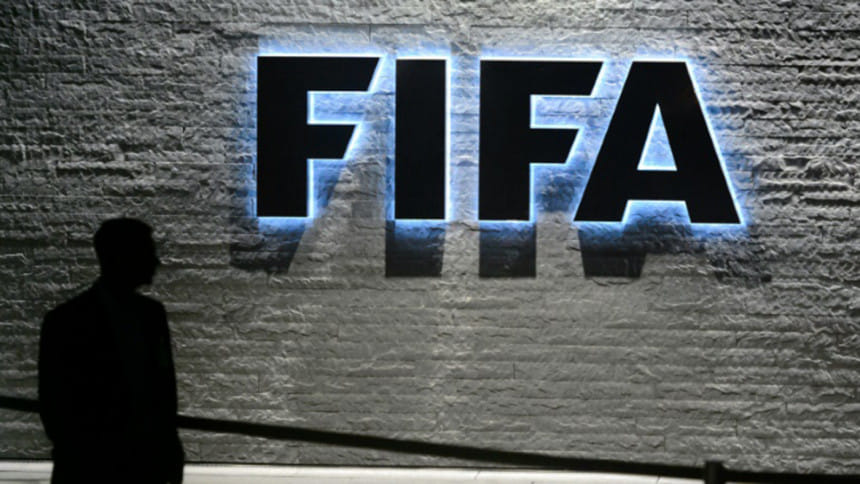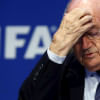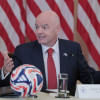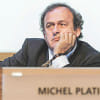FIFA scandal deepens with 16 indicted for corruption

The multi-million dollar corruption scandal engulfing FIFA widened with 16 people indicted by US justice officials who pledged an unremitting crackdown on an "outrageous" betrayal of trust.
The latest dramatic twist in a long-running saga began with a dawn raid on a luxury Zurich hotel where Swiss authorities arrested South American Football Confederation (CONMEBOL) president Juan Angel Napout, and Alfredo Hawit, head of the Confederation of North, Central American and Caribbean (CONCACAF).
Hours later, the two appeared on a list released in Washington of 16 men -- all from the same two confederations -- indicted on charges of corruption.
They included Ricardo Teixeira, the former head of the Brazilian Football Confederation and a former FIFA vice-president; Ariel Alvarado, a Panamanian who sits on FIFA's disciplinary committee; and Rafael Callejas, president of Honduras 1990-1994 and former head of the Honduran football federation.
"The message should be clear to every culpable individual who remains in the shadows, hoping to evade our investigation: You will not wait us out. You will not escape our focus," US Attorney General Loretta Lynch said.
Lynch also revealed that eight other people indicted since authorities launched an earlier wave of FIFA raids in Switzerland in May had now pleaded guilty.
Among those were Jeffrey Webb, a former FIFA vice president and head of CONCACAF, who has admitted racketeering and money laundering.
As part of his plea deal, he has agreed to forfeit more than $6.7 million in assets.
Webb and banned former CONCACAF chief Jack Warner, who was indicted earlier, were also accused of siphoning off cash intended for disaster relief, according to the new indictment.
Hawit, a Honduran national, and Napout of Paraguay are both opposing extradition to the United States, the Swiss justice ministry (FOJ) said.
Both are suspected of taking millions of dollars in bribes in return for selling marketing rights for regional tournaments and World Cup qualifying matches, the FOJ said.
Epicentre of graft
Hawit's predecessor in charge of football in Honduras insisted that he had done nothing wrong.
"He assured and guaranteed that he was not involved in anything illicit," Callejas said.
FIFA's remaining leadership approved a series of measures aimed at improving transparency and curbing the authority of the body's much-maligned executive committee, which has emerged as an epicentre of graft.
The measures include a 12-year term limit for FIFA's president and other senior leaders, public disclosure of compensation for top officials and a pledge to include more women in senior positions.
They must be approved at a meeting of FIFA's 209-member associations in February, when a replacement will also be chosen for the organisation's suspended president Sepp Blatter, who is the subject of a Swiss criminal investigation.
The head of the reform effort, Francois Carrard, told journalists that the measures offered FIFA an opportunity "to renew itself."
Acting president Issa Hayatou, also implicated in previous corruption allegations, said Thursday's arrests "underscore the need to establish a complete programme of reforms."
Despite the pledges for change, outsiders, including major corporate sponsors, may remain sceptical of whether FIFA is capable of fixing itself.
The arrests were carried out at the five-star Baur au Lac hotel, a favourite of FIFA's officials, and the same spot where seven football executives were arrested in May on charges of corruption dating back decades.
Blatter has been suspended for 90-days and is facing tougher punishment by FIFA's ethics watchdog.
Millions of dollars
The man who had been tipped to succeed him, European football chief Michel Platini, has also been suspended over taking a $2 million payment and could be hit with a lifetime ban from football by the end of the month.
Aside from term limits, a full restructuring of the executive committee was approved.
Both Hawit and Napout sit on the executive committee, although their arrests may trigger swift suspensions by the ethics committee.
The Swiss justice ministry said the two had been arrested following requests from the United States issued on November 29.
Prosecutors in New York suspect the two "of accepting bribes of millions of dollars," the FOJ statement said.
The arrests, and the meeting on reforms, came on the fifth anniversary of the 2010 vote that controversially awarded the 2018 World Cup to Russia and the 2022 tournament to Qatar.
Before his suspension, Blatter tipped Carrard to lead a reform drive, after the Swiss lawyer had been widely praised for cleaning up a rotten International Olympic Committee more than a decade ago.
Carrard told reporters that the panel had scrapped an idea for a 74-year age limit for senior officials, calling it "arbitrary."
But in a surprise move, his panel proposed expanding the World Cup from 32 teams to 40 in 2026 to broaden inclusion at the world's premier sports event, although it was not immediately clear how that would aid anti-corruption efforts.
The plan has not yet been approved by the executive committee and remains under review.
Carrard and Hayatou faced tough questions as to whether FIFA insiders could be part of the effort to clean up their act.
"I am aware that the road will be difficult," Carrard said, but stressed that "if you want to achieve reform it must also be carried out from within."

 For all latest news, follow The Daily Star's Google News channel.
For all latest news, follow The Daily Star's Google News channel. 








Comments